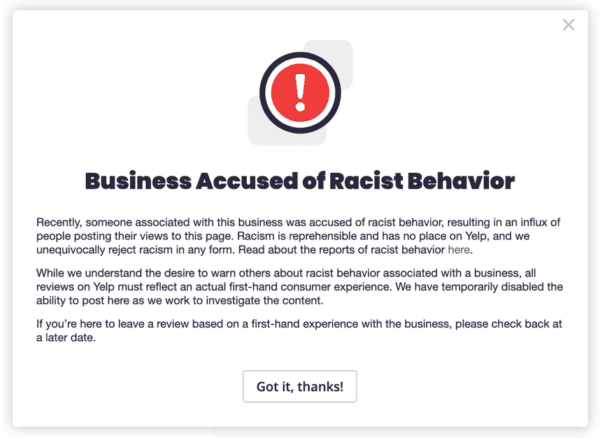
Since the reinvigoration of Black Lives Matter during the summer of 2020, more and more people have joined the movement to end racial discrimination in the United States. Not just individuals, but businesses too are making policy or product changes in an effort to address the role the market plays in abetting cultural racism. For example, Pepsi Co., the parent company of the Aunt Jemima pancake mix, released a statement that the product will be rebranded “to make progress towards racial equality” by abandoning the use of a formerly enslaved woman as a mascot (Ankel, 2020). Similarly, Johnson & Johnson hope to de-mythicize fair skin as ideal by pulling products used to lighten skin tone (Ankel, 2020). However, while most of these organizational changes have been welcomed, others have stirred controversy. Yelp, a company that publishes consumer reviews online, introduced a new alert to their website that will be placed on business pages that have been accused of –but not necessarily found guilty of– racist behavior.
On October 8, 2020, Yelp announced via their blog that the company would be taking several steps to ensure diversity and inclusion are upheld on their platform. In addition to amplifying Black-owned businesses, the post explained that “[Yelp] will now place a distinct Consumer Alert on business pages to caution people about businesses that may be associated with overtly racist actions” (Malik, 2020). When a business receives an influx of reviews mentioning racism, particularly those which appear to be “based on what someone may have seen in the news or on social media rather than a first-hand experience,” Yelp moderators will place a generic Public Attention Alert on the business page which prevents new reviews from being posted as the Yelp Operations Team investigates the accusations (Malik, 2020). In the event that a business is accused of overtly racist actions to the point that a local news article was curated about the incident, Yelp will escalate the generic warning to a Business Accused of Racist Behavior Alert and include a link to the story for consumers to read for themselves (Malik, 2020).
On one hand, there are those who approve of this initiative and feel that it shows Yelp’s genuine desire to help marginalized groups. In the company’s own words, it’s important for consumers to have access to “reliable content to inform their spending decisions, including decisions about whether they’ll be welcome and safe at a particular business” (Malik, 2020).With this warning, minorities can protect their physical and mental well-being by avoiding places where they may be more likely to face discrimination.
On the other hand, some worry this new alert has a high potential for misuse. The most glaring problem they anticipate is aiding the spread of cancel culture with only an accusation, not a provable offense. Especially for small businesses, just one bad review on Yelp can be detrimental, let alone being accused of racism. This is even more concerning given the problem of weaponizing fake-reviews that is already rampant on Yelp. Here, customers can threaten businesses with a bad review unless they receive certain perks or even seek revenge if a business doesn’t cater to their every whim. For example, a negative reviewer told his Toronto contractor that he would delete his false bad review if the business agreed to take $1,000 off the project tab (Aarts, 2015). Similarly, many Yelp users in San Francisco have flooded restaurants enforcing COVID-19 mask policies with bad reviews despite noting great food service (Batey, 2020). Ultimately, some view the Racist Behavior Alert as exacerbating an already unbridled issue – Dealing with false accusations about poor performance is difficult enough without also having to deal with accusations of immorality.
However, many have pointed out that there are safeguards in place in order to prevent the alert from being abused. Namely, utilizing a team of moderators who can manage the label and disable content that is not coming from a first-hand experience helps to avoid fake-review bombardments. Yelp argues that “this policy is critical to maintaining the integrity of content on [the] platform. We don’t allow people to leave reviews based on media reports because it can artificially inflate or deflate a business’s star rating” (Malik, 2020). Additionally, because the escalated alert must be accompanied by a news article from a “credible media outlet,” incidents which warrant it are “extremely rare” (Oxner, 2020). Ultimately, this doesn’t fundamentally alter the platform because, label or no label, consumers can still accuse businesses of racism in their individual reviews – This initiative only kicks in when an influx of racially-charged reviews are submitted. As one Twitter user pointed out: “If you’re not a racist business, what would lead them to label you one?” (Lerman, 2020).
Despite these arguments, critics remain skeptical. While it seems harmless enough, or even helpful, for the company to freeze review-mobbing while the matter is investigated, the question of “how” they intend to go about checking thousands of daily reviews, or what standards they use to determine if something is racist in the first place, remains unclear. As has been the subject of much debate lately, even with a link to a reputable source, not everything covered in the news is real, accurate, or fair. Furthermore, while the company points to “overtly racist actions” as their starting point, they include no further details to what that entails. While using slurs may be obvious, an argument could be made that a number of other actions are racist – For instance, the cultural appropriation of AAVE. Where Yelp draws the line is unknown.
In the end, as the fight against racial discrimination continues, more and more businesses are adopting new techniques in order to support social equality and safety. But in the case of Yelp, many are still left wondering if their new Accusation of Racist Behavior Alert will be helpful in any meaningful way. While the label has potential to give a fair warning of racist incidents, given Yelp’s already rampant problem with fake-reviews, they may be misguidedly trying to protect minorities from a non-problem and harming small businesses along the way. Will this alert be useful in the battle towards ending racial discrimination, or is it just another tool of cancel culture? Perhaps only time will tell.
Discussion Questions:
- What are the central values at stake in evaluating Yelp’s decision to introduce a “Business Accused of Racist Behavior” alert?
- Do you think this kind of label is helpful in fighting racial discrimination? If not, what are some other ways businesses could update their policies to support racial equality in a more meaningful way?
- Despite using neutral words like “may be associated with racist behavior,” does adding a platform-based alert give unfair legitimacy to unproven accusations? Should Yelp re-write this new label? What should they add/change, if anything?
- What are the general ethical obligations of review-aggregating sites in regard to the pursuit of social justice? Are there instances where they can justifiably ignore issues of social justice?
Further Information:
Aarts, D. (2015, February 19). “Online Review Sites Allow Bad Customers to Become Blackmailers.” Canadian Business. Available at: https://www.canadianbusiness.com/blogs-and-comment/yelp-tripadvisor-review-blackmail/
Ankel, S. (2020, June 24). “30 Days that Shook America: Since the Death of George Floyd, the Black Lives Matter Movement has Already Changed the Country.” Business Insider. Available at: https://www.businessinsider.com/13-concrete-changes-sparked-by-george-floyd-protests-so-far-2020-6
Batey, E. (2020, September 11). “Yelpers Are Going After San Francisco Restaurants That Enforce Mask Policies.” San Francisco Eater. Available at: https://sf.eater.com/2020/9/11/21432246/yelp-reviews-masks-san-francisco-seven-stills
BBC. (2020, October 12). “Yelp to Label Businesses Accused of Racist Behaviour.” BBC News. Available at: https://www.bbc.com/news/technology-54508911
Greenfield, Scott. (2020, October 9). “Yelp, Weaponized and Canceled.” Simple Justice. Available at: https://blog.simplejustice.us/2020/10/09/yelp-weaponized-and-canceled/
Lerman, R. (2020, October 9). “Yelp Will Label Businesses’ ‘Racist Behavior’ but Some Worry it Could be Misused.” The Washington Post. Available at: https://www.washingtonpost.com/technology/2020/10/09/yelp-racist-behavoir-label/
Malik, N. (2020, October 14). “New Consumer Alert on Yelp Takes Firm Stance Against Racism.” Yelp. Available at: https://blog.yelp.com/2020/10/new-consumer-alert-on-yelp-takes-firm-stance-against-racism
Oxner, R. (2020, October 9). “Yelp Will Label Businesses Accused of Racist Behavior.” National Public Radio. Available at: https://www.npr.org/sections/live-updates-protests-for-racial-justice/2020/10/09/922271718/yelp-will-label-businesses-accused-of-racist-behavior
Authors:
Claire Coburn, Kat Williams, & Scott R. Stroud, Ph.D.
Media Ethics Initiative
Center for Media Engagement
University of Texas at Austin
April 26, 2021
Image: Yelp screencapture
This case was supported by funding from the John S. and James L. Knight Foundation. These cases can be used in unmodified PDF form in classroom or educational settings. For use in publications such as textbooks, readers, and other works, please contact the Center for Media Engagement.
Ethics Case Study © 2021 by Center for Media Engagement is licensed under CC BY-NC-SA 4.0




